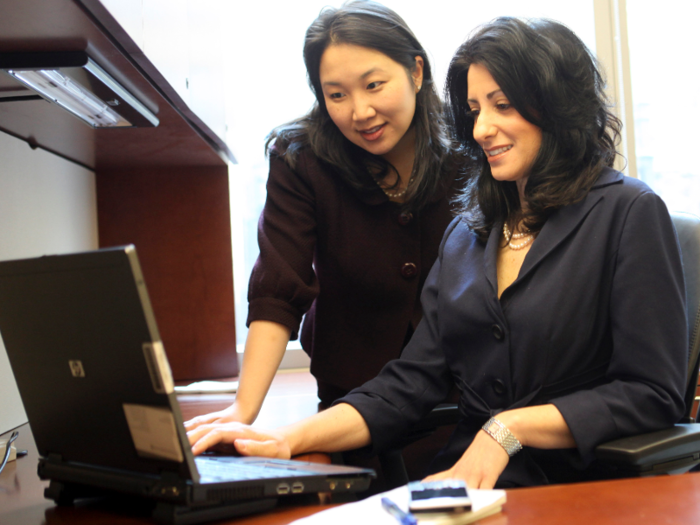- Home
- slideshows
- miscellaneous
- 7 things you should never say to a pregnant coworker
7 things you should never say to a pregnant coworker
"Wow, you're getting big!"

"Are you ready for your vacation?" (In reference to maternity leave)

Caring for a newborn is not a vacation, said Liz Gulliver, the CEO of working parent advocacy company Kunik. Newborns sleep irregularly and require constant attention. On top of the physical stress parents encounter dealing with a newborn, 17.7% of new mothers worldwide experience postpartum depression.
Plus, the US is the only developed country that does not guarantee new parents get paid parental leave — meaning some workers might not get paid to care for a newborn.
For parents fortunate enough to get paid leave, they may draw envy from coworkers who never cared for children. These colleagues might think of parental leave as a "vacation," Gulliver said, where parents get paid not to work.
"I think that most people who haven't had kids don't understand [parental leave] and view it as kind of a paid vacation that they're not getting access to," Gulliver told Business Insider.
Insinuating parental leave is a vacation can make pregnant mothers feel unsupported by their colleagues, Gulliver added. Plus, many expectant mothers are already worried about falling behind during their time away from work — minimizing the leave only adds to the stress.
"Hearing comments like that is disparaging, and it really makes them feel as though they are not a vital, contributing member that people are looking forward to return," she said.
"I guarantee you won't be able to leave your baby once maternity leave ends."

Gulliver, who spoke with hundreds of working women as she started her company on their experience with pregnancy, said that their colleagues would often assume they would never return to work.
Although more women graduate from college than men, and women now make up the bulk of the college-educated workforce, 64% of women leave work after having a baby, according to a 2017 study.
Some of this has to do with the childcare and household labor that still falls on women's' shoulders: mothers spend 32 hours per week on non-paid work, while fathers spend just 18 hours, according to Pew.
Assuming a woman won't come back to work further makes her feel alienated, Gulliver said.
"When you have in the back of your head those comments that people made you before you leave, it does not fill you with confidence," Gulliver said. "I'm sure some of those comments impacts people's decisions about whether to return or not."
Furthermore, assuming a mom will be so closely bonded to her baby she can't come back to work is sexist, Green said, as many women look forward to coming back.
"Almost no one tells expectant fathers they'll change their plans and end up becoming stay-at-home-dads," she said.
"Is it a boy or girl?"

While asking the gender or name of the baby seems benign, these are private topics between the pregnant woman and her partner, Taylor said.
The pregnant woman might be waiting until the baby is born to decide the name or find out the gender. Some research also links certain medical problems with a fetus' gender.
No matter the reason, this private information is none of your business, and should only be discussed if the woman brings it up herself.
"Can I touch your bump?"

Pregnant women can sometimes feel like their colleagues assume they can touch their baby, but this is another move that violates a woman's personal space, said Michelle Kennedy, the CEO of Peanut, an app that connects expectant mothers to each other.
"It is one of the worst offenders," Kennedy told Business Insider. "I didn't want to be petted."
Kennedy adds colleagues should only touch a baby bump unless explicitly invited to do so, though she cautions that probably won't happen often.
"You really shouldn't be drinking coffee."

"Everybody's an expert when you're pregnant," Taylor said. She said pregnant women often hear unsolicited advice on their eating and drinking habits at work, including:
- "Just say no to caffeine."
- "Good thing you're not drinking."
- "Drink more water."
- "Watch the sugar."
What's worse, the advice comes from people who themselves don't know much about how pregnant women should eat or drink, Kennedy said. No one is more aware of how they should eat than the pregnant woman, the CEO added, and they don't need any more advice.
"If she weren't pregnant and you were commenting on what someone was doing, that it wouldn't be tolerated," Kennedy said. "And yet pregnancy becomes open seasons for these things."
"Was the baby planned?"

Never ask if the baby "was planned," Taylor said. That's way more information than you are entitled to.
Furthermore, the question is a somewhat roundabout way to inquire about your colleague's sex life — a topic that has no place at work.
While this question might not come up a lot at work, Green advised one woman whose intern had asked whether she planned the baby. The woman did not think the intern intended to be invasive; instead, she figured the younger employee came from a sheltered background and hadn't been exposed to many pregnant women.
"Since she's an intern and part of the reason she's there is to learn professional norms, I'm coming down on the side of saying something," Green said in her advice column. "If she seems mortified, you could add, 'Please don't be mortified. I realize you probably don't have a lot of peers getting pregnant and so may not have much experience with pregnancy announcements.'"
Instead of being invasive, just offer a helping hand and leave the conversation at "Congratulations."

While there are many questions that can irk expectant mothers, some comments are welcome — like a simple "congratulations."
"People would say to me, 'Gosh, you are tiny' or 'you look huge' or any of those pejorative, horrible comments, and all I really wanted someone to say is, 'Congratulations,'" Kennedy said.
Pregnant coworkers would also appreciate if you offered to pick up the slack on assignments if they have an appointment, or any help with other work-related things, Taylor added.
"Anything work related that you can do is great," she said. "Business as usual is always appreciated."
Popular Right Now
Popular Keywords
Advertisement